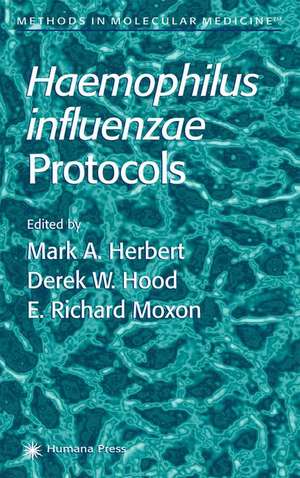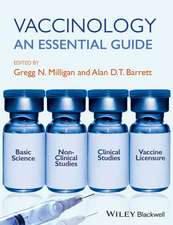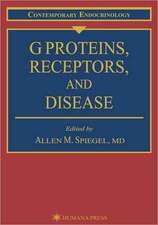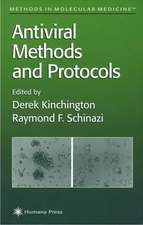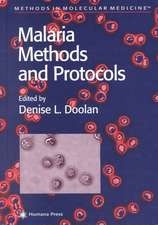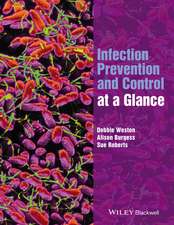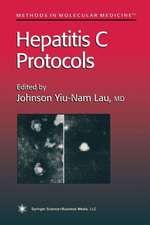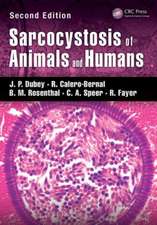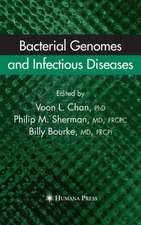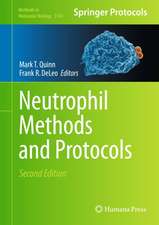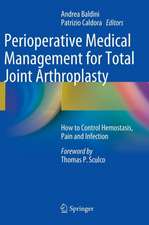Haemophilus influenzae Protocols: Methods in Molecular Medicine, cartea 71
Editat de Mark A. Herbert, Derek W. Hood, E. Richard Moxonen Limba Engleză Hardback – 25 sep 2002
| Toate formatele și edițiile | Preț | Express |
|---|---|---|
| Paperback (1) | 1034.83 lei 6-8 săpt. | |
| Humana Press Inc. – 9 noi 2010 | 1034.83 lei 6-8 săpt. | |
| Hardback (1) | 726.32 lei 6-8 săpt. | |
| Humana Press Inc. – 25 sep 2002 | 726.32 lei 6-8 săpt. |
Din seria Methods in Molecular Medicine
- 5%
 Preț: 1278.74 lei
Preț: 1278.74 lei - 15%
 Preț: 655.78 lei
Preț: 655.78 lei - 5%
 Preț: 1106.50 lei
Preț: 1106.50 lei - 5%
 Preț: 727.44 lei
Preț: 727.44 lei - 5%
 Preț: 1108.72 lei
Preț: 1108.72 lei - 15%
 Preț: 650.55 lei
Preț: 650.55 lei - 5%
 Preț: 735.66 lei
Preț: 735.66 lei - 18%
 Preț: 947.35 lei
Preț: 947.35 lei - 18%
 Preț: 948.92 lei
Preț: 948.92 lei - 5%
 Preț: 1114.54 lei
Preț: 1114.54 lei - 5%
 Preț: 1114.91 lei
Preț: 1114.91 lei - 15%
 Preț: 658.55 lei
Preț: 658.55 lei - 5%
 Preț: 734.01 lei
Preț: 734.01 lei - 5%
 Preț: 1111.61 lei
Preț: 1111.61 lei - 5%
 Preț: 1104.32 lei
Preț: 1104.32 lei - 5%
 Preț: 723.21 lei
Preț: 723.21 lei - 5%
 Preț: 1106.13 lei
Preț: 1106.13 lei - 5%
 Preț: 723.05 lei
Preț: 723.05 lei - 5%
 Preț: 1108.35 lei
Preț: 1108.35 lei - 5%
 Preț: 723.42 lei
Preț: 723.42 lei - 5%
 Preț: 1115.65 lei
Preț: 1115.65 lei - 5%
 Preț: 786.86 lei
Preț: 786.86 lei - 5%
 Preț: 1133.01 lei
Preț: 1133.01 lei - 5%
 Preț: 1114.71 lei
Preț: 1114.71 lei
Preț: 726.32 lei
Preț vechi: 764.55 lei
-5% Nou
Puncte Express: 1089
Preț estimativ în valută:
138.98€ • 145.50$ • 114.100£
138.98€ • 145.50$ • 114.100£
Carte tipărită la comandă
Livrare economică 05-19 aprilie
Preluare comenzi: 021 569.72.76
Specificații
ISBN-13: 9780896039285
ISBN-10: 0896039285
Pagini: 333
Ilustrații: XI, 333 p.
Dimensiuni: 155 x 235 x 24 mm
Greutate: 0.68 kg
Ediția:2003
Editura: Humana Press Inc.
Colecția Humana
Seria Methods in Molecular Medicine
Locul publicării:Totowa, NJ, United States
ISBN-10: 0896039285
Pagini: 333
Ilustrații: XI, 333 p.
Dimensiuni: 155 x 235 x 24 mm
Greutate: 0.68 kg
Ediția:2003
Editura: Humana Press Inc.
Colecția Humana
Seria Methods in Molecular Medicine
Locul publicării:Totowa, NJ, United States
Public țintă
ResearchCuprins
The Pathogenesis of Disease Due to Nontypeable Haemophilus influenzae.- The Pathogenesis of Disease Due to Type b Haemophilus influenzae.- General Methods for Culturing Haemophilus influenzae.- Transformation of Haemophilus influenzae.- Diagnosis of Infection.- Characterization of Plasmids.- Protein Characterization by Two-Dimensional Gel Electrophoresis.- Monitoring Gene Expression Using DNA Arrays.- Gene Expression Technology.- The Genome Sequence of Haemophilus influenzae.- Structural Profiling of Short-Chain Lipopolysaccharides from Haemophilus influenzae.- Mutagenesis of H. influenzae.- Transposon Tn 10.- In Vivo Expression of Bacterial Genes During Human Infections.- ELISA.- Opsonophagocytosis Assay Using Flow-Cytometry.- In Vitro Models of Infection I—Human Respiratory Tissue Organ Culture.- In Vitro Models of Infection II—Human Umbilical Vein Endothelial Cells (HUVECs) System.- Animal Models.
Recenzii
"This excellent book is recommended for investigators involved in laboratory research on H. influenzae from the beginning student to the experienced investigator. The book contains abundant, detailed protocols and practical tips that will be useful for all investigators." - Clinical Infectious Diseases
"...an excellent source book and an inspiring reading." - International Journal of Medical Microbiology
"In addition to detailed information provided in the individual chapters, the book is also valuable by providing an extensive list of 841 references....there are not many microbiological books of such high quality. The authors present highly specialized information in a comprehensible and friendly way." -Folia Microbioligica
"...an excellent source book and an inspiring reading." - International Journal of Medical Microbiology
"In addition to detailed information provided in the individual chapters, the book is also valuable by providing an extensive list of 841 references....there are not many microbiological books of such high quality. The authors present highly specialized information in a comprehensible and friendly way." -Folia Microbioligica
Textul de pe ultima copertă
As the second leading bacterial cause of community-acquired pneumonia, H. influenzae accounts for many thousands of deaths per year worldwide, and is a prime candidate for the identification of targets that can lead to the development of novel vaccines and antibiotics. In Haemophilus influenzae Protocols, leading research scientists and infectious disease specialists detail in a readily reproducible format the major molecular and immunological techniques for exploring the pathogenicity of this significant bacterium. Described with step-by-step instructions to ensure robust and successful experimental results, the techniques cover plasmid analysis, proteomics, genomics, DNA array technology, gene expression, mutagenesis (transposon and nontransposon), and structural analysis. The antibody techniques presented include IVIAT, ELISA, and opsonophagocytosis assays. Also included are reviews of the pathogenesis of NTHi and Hib, methods for working with the organism, culture and storage conditions, molecular diagnosis, and systems for exploring pathogenesis in both in vitro and animal models.
Comprehensive and highly practical, Haemophilus influenzae Protocols offers a unique collection of powerful molecular methods that illuminate not only how the bacterium causes disease, but also how best to develop much-needed new vaccines and antibiotics against it.
Comprehensive and highly practical, Haemophilus influenzae Protocols offers a unique collection of powerful molecular methods that illuminate not only how the bacterium causes disease, but also how best to develop much-needed new vaccines and antibiotics against it.
Caracteristici
Includes supplementary material: sn.pub/extras
